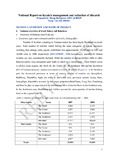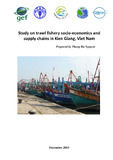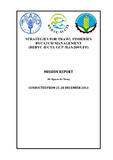Report on Data Collection of Trawl Fisheries By catch in Kien Giang , Vietnam 2014
Description
Increasing human populations and exploitation pressures, growing threats from pollution and major ecosystem change are particular concerns to marine fisheries in Vietnam in general and in KienGiang in particular. Also – as more widely in the global context – the nontargeted capture of fish and non‐fish species (e.g. turtles, corals and other seabed fauna), commonly called bycatch and discards, and are also of concern. This part of the catch tends to be poorly monitored and unmanaged but could have an important impact on fishery resources, habitats and ecosystems. In some fisheries and regions, there is an increasing trend towards the retention of the bycatch consisting of juveniles and small‐sized fish for use as food for human consumption or for utilization as aquaculture feed. This is therefore a complex issue, requiring resource and biodiversity aspects to be tackled alongside human needs and involving a mix of policy, technical and community support measures. The project “Strategies for trawl fisheries bycatch management” (REBYC‐II CTI) was conceived based on the successes of the 2002‐2008 FAO/UNEP/GEF global project “Reduction of Environmental Impact from Tropical Shrimp Trawling through the Introduction of Bycatch Reduction Technologies and Change of Management”. The REBYC‐II CTI project focuses on multispecies bottom trawling, where by catch issues are amongst the most serious, with potentially significant effects on ecosystems and livelihoods. The Project is addressing these challenges by promoting sustainable fishing practices and improved management of trawl fishing. The REBYC‐II CTI project was developed under the leadership of FAO (the Project implementing agency) in close collaboration with its partners: Southeast Asian Fisheries Development Center (SEAFDEC) and the governments of the participating countries; Indonesia, Papua New Guinea, Philippines, Thailand and Viet Nam. KienGiang province was selected as a pilot site to implement the project in Vietnam. Marine capture fisheries of Vietnam have developed strongly and have significantly contributed to the socio‐economic development, food security and maritime sovereignty of Vietnam. Over the past few years, in KienGiang Province, marine capture fisheries have considerably increased and are contributing significantly to the economic development of the Province. However, these increases have revealed many problems such as unsustainable development, insufficient fisheries management, uncontrolled number of fishing boats and fragmented small‐scale fishing operations. Illegal fishing has been occurring and is threating marine resources sustainability, especially in the coastal areas. To overcome these shortcomings there is a need to manage capture fisheries better and maximize the efficiency of using these resources whilst conserving the marine ecosystem. For this the development the implementation of fishing capacity management mechanisms will be very important. It is also recognized that the fishing capacity management tools such as various fishing gear restrictions and closed fishing seasons/areas will likely be the most relevant so that marine fisheries can continue make significant contributions to socio‐economic development, food safety and security, coastal community livelihoods, and generation of foreign exchange through the export of fish and other fisheries products. The REBYC‐II CTI Project in Vietnam works closely with DECAFIREP and Provincial staff in KienGiangProvince, which is amongst the provinces with the highest number of trawlers in Vietnam. According to a recent report of local authority of KienGiang province, there are total of 12,435 fishing vessels registered in the province. Of those, the number of trawlers is 3,265 accounting for about 26% of the total number. However, the total catch from the trawl fisheries in KienGiang (and Vietnam overall)is not known with any degree of certainty. There is a lack of operational‐level data on catches for all regions and therefore the trends in catch rates are difficult to monitor. Although a national legal framework has been established to implement a logbook program requiring the cooperation of fishing communities, implementation has been weak due to the lack of compliance and enforcement. The difficulty of catch monitoring is also exacerbated by the complex multi‐species and multi‐gear nature of the trawl fishery in KienGiang province. This report was prepared under the REBYC‐II CTI activity ‘Data collection of trawl fisheries by catch in KienGiang waters of Vietnam’. The expected outputs are: (1) the collection of data relating to total landings by selected trawl fishery fleets; (2) total bycatch by selected trawl fishery fleets (trash* fish, juveniles and sharks, rays and coral fragments); and (3)monthly species and size composition and volumes of catch and bycatch by selected trawl fishery fleets (by season, area, vessel type, gear type)
การอ้างอิง
Hoai Nam, N., Thi Hien, N., TheAnh, N., Viet Ha, V., & Van Cuong, T. (2014). Report on Data Collection of Trawl Fisheries By catch in Kien Giang , Vietnam 2014. Training Department, Southeast Asian Fisheries Development Center.
คอลเลกชัน
- Country Activities [95]
รายการที่เกี่ยวข้อง
แสดงรายการที่เกี่ยวข้องตามชื่อผู้แต่งผู้สร้างและเรื่อง
-
National Report on Bycatch Management and Reduction of Discards
Thong, BaNguyen; Dang, Van Thi (2009)National consultants are invited from fisheries research institutes and working under the contracts signed with project manager/project in charge organism. The appropriate candidates basically will work on short time period ... -
Study on Trawl Fishery Socio-Economics and Supply Chains in Kien Giang, Viet Nam
Nguyen, Thong Ba (Training Department, Southeast Asian Fisheries Development Center, 2015-12)This study on the socio-economics and supply chain of trawl fisheries in Kien Giang province, Viet Nam, was conducted during November and December 2015, and focused on otter trawler fleets, shrimp trawlers, anchovy pair ... -
Mission Report
Ba Thong, Nguyen (2013)Mr. Nguyen TienThang, DECAFIREP’s staff presented summaries of activities planned to implement in Vietnam for the first year. During his presentation, he also overviewed brief information of the project as indicated in the ...




